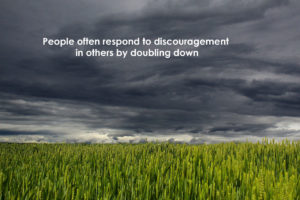The natural response when we encounter someone that is facing discouragement is often to double down. It is a human tendency to back away from negative emotions. When we interact with discouragement, there are two common responses: the cheerleader or the fixer.

- The cheerleader says something like “You shouldn’t be discouraged. It’s not that bad.” And the discouraged person is now also discouraged by the feeling that their discouragement is a sign of weakness.
- The fixer says something like “Have you tried……?” And the discouraged person is now also discouraged by the feeling that it should be easy to recover from their discouragement.
Why do we back away from negative feelings? First, there is a neuroscience explanation. The limbic system in our brain responds to negative feelings by telling us that we should flee, fight, or freeze because negative feelings could indicate danger. Add to this the fact that many people are raised in an environment where they are told “Don’t feel sad, don’t feel angry, don’t feel any negative emotion.” We learn to either run from or hide from negative emotions.
Negative emotions, while not as enjoyable, are as natural as positive emotions. All of us have occasions when we experience negative emotions. As a leader we need to learn to lean into negative emotions rather than flee from them. By doing so we can help our constituents deal with these negative emotions in an effective way. To deal with discouragement or disappointment, we first need to validate that those feelings are real and rational. People must effectively process the negative emotion before they are able to move on to recovery.
If someone has failed, had a loss, or just feels that they are not where they had hoped to be, we can often help them best by accepting or validating those feelings. We do that best by accepting their discouragement or allowing them to vent. We can also validate their feelings by identifying with them, relating a short story of our own similar discouragement. Another way to validate is to express empathy, to feel discouragement along with them. (For a helpful explanation of empathy and how it differs from sympathy, see Brené Brown’s video.) Often the best course when we encounter someone that is discouraged or disappointed is to simply ask “What do you need from me?” If they are looking for a cheerleader or a fixer, we can go there. If they are still processing their negative emotions, we may be able to help them do so more effectively by validating them. Sharing our feelings with others is an effective way of processing them.
And the same should hold true for us as leaders. When we have our own disappointments or discouragement, we should ask the safe people around us for the validation that we need to deal effectively with our own negative emotions. “I’m feeling discouraged by ____ and here is what I really need right now.”
Are you able to lean into negative emotions? What are you doing to develop this capacity?

Add your comment